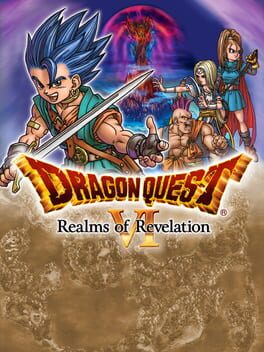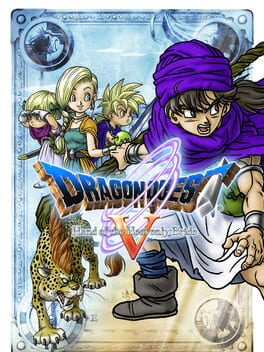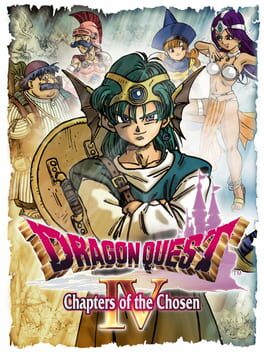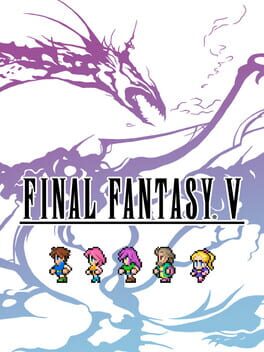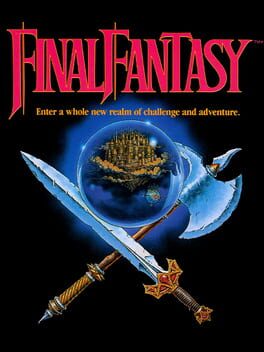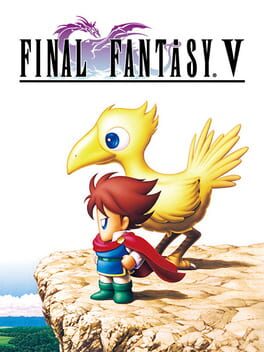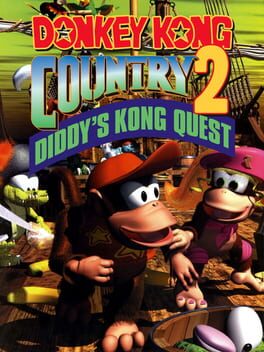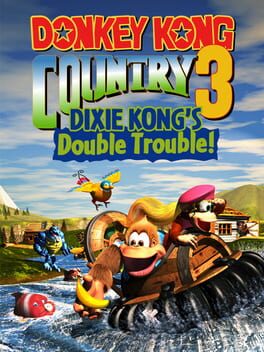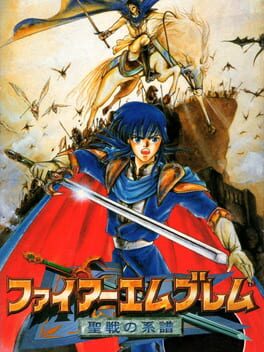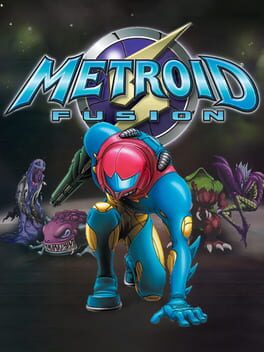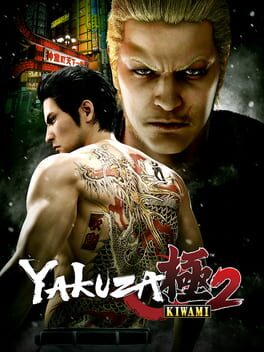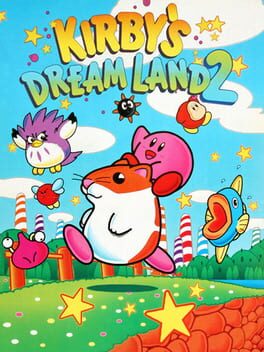Shin_Vertigo
Overall, a pretty standard and enjoyable entry in the Dragon Quest series. The story has some cool elements and ideas throughout, but is not quite focused on as much as I'd have liked. I think what they have is cool, I'd just like to see more of it (and more character growth too). The cast was cool and had some interesting moments throughout the game. I think this easily fixes most of my issues with the vocation system in DQ3, making it much easier and more rewarding to utilize throughout the game. I do find it to be too grindy just for that part though, and I wish they could've toned that down a bit to make progression through each vocation a bit faster. I like being able to customize the cast, and I'm happy it doesn't come at the cost of having actual characters with motivations and personalities like in 3. Physical vocations get some pretty cool skills this time, and overall the game does have some better balance towards various skills compared to prior entries in the series. While this game can be pretty basic and doesn't do much to stand out, I think it's a fun rpg that isn't all too long and has decent replay value with its vocation system.
This is definitely the best game in the series compared to the games that came before it. It has the most story (and a pretty good one too) and best general gameplay. The party changes throughout the game, which is cool. You can recruit monsters eventually, which helps pad out the lack of proper party members during some parts of the game, but it never feels overbearing or all that difficult to get decent Monsters to use. If you want specific ones it might take a while, but some of the best ones are very easy to get. This is the first in the series I played pretty much entirely without using a walkthrough, and it was nice being able to either know where to go or be able to figure it out reasonably quickly. The soundtrack was good, combat feels similar to DQ4, and the world is pretty fun to explore. Party chat was really cool in some spots. The story itself was surprisingly unique compared to most other rpgs I've played, which was nice to see. It was still somewhat simple in nature, but there are multiple memorable scenes that will stick with me for a while. Probably one of the least grind-heavy games I've played so far in the series. Sometimes the game could feel a bit too easy, but it was generally just an enjoyable experience throughout. I could easily recommend this to anyone who has yet to play it.
I think the game is leagues better than DQ3, at least in my experience. The characters are much more fleshed out, even if they could be even more fleshed out. The story seems to be much more present in the game than in the first three, and there's a lot more music and bosses than those games as well. I like the chapter system introducing characters before they join the main party a lot. It makes the start of chapter 5 cool as you want to hurry and gather up a team of characters you've had before. I do wish they had done a better job with the Hero's story though. I think they should not have shown us the Hero at the start to not just jarringly switch to a whole different character out of nowhere. They could've also shown glimpses of the Hero between chapters to fix this. Combat in DQ4 was generally enjoyable. I really liked the ability to swap your party out freely in certain battles, as that made it feel pretty different from the older games. I like the ease of grinding exp later on in the game from the Metal Slimes, although money is still annoying to grind for. Chapters 2 and 3 can drag a bit in certain sections, but otherwise I enjoyed the pacing. I wish chapter 6 added more stuff to do after getting the 9th chosen, as they expect you to grind a bit too much if you want to see their full potential. I didn't hate fighting any of the bosses like I did in DQ and DQ3 for the annoying final bosses. Overall, a solid entry, and a surprisingly good title to come from the NES, even if the version I played was somewhat reworked.
Overall, the game was really fun and had a lot of cool content. The game is even bigger that Yakuza: Like a Dragon, which is surprising since Yakuza 7 was already a decently big game. Yokohama was a bit less interesting to explore this time around, as not too much has changed since 7, and aside from some of the old minigames that return, there's not a lot to it. Hawaii is the real focus here, and it was honestly really cool to explore. The map is similar in size to Yokohama, and is as fun to explore as Yokohama was back in 7. The gameplay is an evolution of the rpg combat introduced in Yakuza: Like a Dragon, with the addition of enemy guarding (and grab skills to counter it), player movement during combat, and a revamped skill inheritance system from different jobs. Once you reach a point further into the game, you will start to have an additional party member that sits out during fights, but the tag-out system allows you to swap characters into the fight when you need them. While this was introduced in the previous game, this system feels better in 8 due to your limited access to character variety. Since your party will have no more than 5 characters, swapping characters is more meaningful and I found it both fun and useful to use it often, much more than in Yakuza 7. Each class feels generally better than it did in the last game, and there is more reason to use classes other than a character's starting class now as well. Skill inheritance now allows you to bring over nearly any skill you want from another job, with a limitation on the total inherited skills. This can be used to better customize jobs, and gives you a reason to level up more jobs and max your bond with your party members. Movement in battle is really cool, and it adds a lot of strategy to fights that Yakuza: Like a Dragon didn't have. In general, combat in 8 is just a better version of 7's combat. Finally, the story for 8 was a pretty solid entry in the franchise storyline. It's cool to see Kiryu work through his struggles left over from the previous game, and getting to see his interactions with Ichiban was really cool. I think the main antagonists are fairly cool, although they don't make it to the greatness that other characters reach in some previous games, like Ryugi Goda from Yakuza 2 or the Dojima Lieutenants from 0. That being said, they do add to the story and it is cool to see how the plot unfolds. One of the highlights here is Kiryu's story and substories, which often involve him connecting with characters from his past again. This is something fans have wanted for a long time now, and many important characters from his past are either seen directly or mentioned in reminiscence. Another highlight has a new character, Yamai, who is able to become a very memorable and interesting character throughout the game. Overall, I really liked this game, and I plan to go back to play through the post-game Dungeon and maybe even New Game+.
2021
Overall a fairly good experience throughout, with some issues that don't really get resolved. The story was a shorter and simpler story compared to other games in the series. The characters have some development, but feel somewhat one-note for the most part. Most characters only have a few defining characteristics, which leads to them being somewhat interesting, but also to them feeling underdeveloped by the end. While I appreciated the uniqueness of the combat system at first, it grows old by the end with the slow-paced leveling for jobs well into the second act. Many enemies would still give the bare minimum ABP for increasing job level, making learning multiple jobs annoying without using the Pixel Remaster menu that boosts ABP earned in battles. Even then, some abilities require insane amounts of ABP to obtain. The last ability for Red Mage costs 999 ABP to get, and while it is a really good ability, I honestly don't see anyone getting that without dedicated grinding. While the job system does leave a lot of room to customize your group throughout the game, I was disappointed to see that physical fighters seemed to have one strong set-up (dual-wield, spellblade, rapid fire) and not much else. Mages have more options, with solid jobs like White, Black, Time, and Blue Mages, as well as Summoner. While I do think the system is innovative on the job system from the first and third games in the series, I still see it as lacking in strong options later on, and the pacing for upgrades is really not that good. In spite of this, the game was still pretty fun overall. The strong options, while a bit limited in quantity, are cool and fun to use. There are some interesting boss fights throughout the game with unique mechanics, which is cool to see. The music was honestly great, and the pacing of the story was solid until the third act (kinda just becomes confusing on where to go at that point).
1987
There really isn't much special about FF1 aside from being a more basic and simple JRPG. The spell casts system is definitely different than what I'm used to, but I think it works alright in place of MP. Equipment throughout the game seemed to go exclusively to my Knight/Warrior, which kinda sucks. Literally had a leather hat on my mages until the ribbons came along later. I do like the acquisition rate of new items though, even if a lot of them get immediately swapped out. To an extent the game is fairly straightforward, with it being not too difficult to know what to do next, although some parts were not the most obvious. I'm not a fan of enemy formations having up to 9 enemies sometimes, and I also don't like that basic enemies can inflict status ailments so easily, but other than that battles weren't that bad. Final boss, at least in the Pixel Remaster, is overtuned. The boss did not fit in with the overall difficulty of the game prior, which was really annoying. The story wasn't really there, basically nothing happens story-wise at all, and the characters are all blank slates that don't do anything. Not a bad game to play for a quick early JRPG, similar to DQ1, but also not without the same flaws of those early games either.
1992
Overall a fairly good experience throughout, with some issues that don't really get resolved. The story was a shorter and simpler story compared to other games in the series. The characters have some development, but feel somewhat one-note for the most part. Most characters only have a few defining characteristics, which leads to them being somewhat interesting, but also to them feeling underdeveloped by the end. While I appreciated the uniqueness of the combat system at first, it grows old by the end with the slow-paced leveling for jobs well into the second act. Many enemies would still give the bare minimum ABP for increasing job level, making learning multiple jobs annoying without using the Pixel Remaster menu that boosts ABP earned in battles. Even then, some abilities require insane amounts of ABP to obtain. The last ability for Red Mage costs 999 ABP to get, and while it is a really good ability, I honestly don't see anyone getting that without dedicated grinding. While the job system does leave a lot of room to customize your group throughout the game, I was disappointed to see that physical fighters seemed to have one strong set-up (dual-wield, spellblade, rapid fire) and not much else. Mages have more options, with solid jobs like White, Black, Time, and Blue Mages, as well as Summoner. While I do think the system is innovative on the job system from the first and third games in the series, I still see it as lacking in strong options later on, and the pacing for upgrades is really not that good. In spite of this, the game was still pretty fun overall. The strong options, while a bit limited in quantity, are cool and fun to use. There are some interesting boss fights throughout the game with unique mechanics, which is cool to see. The music was honestly great, and the pacing of the story was solid until the third act (kinda just becomes confusing on where to go at that point).
Overall, I have kinda mixed feelings about it. I've seen a lot of people say it's a general improvement on the original, but I feel like I enjoyed some parts better and some parts less. I liked the differences between the characters in this game compared to the original. Having them both feel slightly different and offer different mechanics was really interesting, and made certain levels more enjoyable to go through. I liked the aninal buddy levels, although I did not enjoy the green lava one at all. It just made you go super fast with characters you don't use too much, and I felt very quickly overwhelmed with the pacing. I also didn't really like the parrot all that much. Every time I used it I just felt like I got hit unfairly from above or below, and I died a lot due to that issue. I did enjoy the bosses a lot more than in DKC1. In 2 they're definitely not just single try bosses all the way through like in DKC1. I actually felt challenged by a few, especially K. Rool this time around. I will say I kinda miss the difficulty curve for the original. I felt like that later levels in DKC2 were all pretty hard, where in the original there were still some easy ones thrown in there. I definitely enjoyed that change of pace in the original, where in 2 I just kept getting more and more annoyed as I kept dying in all of the last couple stages. Overall I feel like I enjoyed the game about as much as DKC, maybe slightly more or slightly less.
I had a decent bit of fun still, but overall the game was just not as interesting as the first two. I enjoyed the bosses more than the ones from the first two, and I actually think the final boss is better than the one in the others. I felt like it didn't take years to master each step of the fight like it was for 2, and it had more depth than the fight in 1. But the levels themselves just were less enjoyable. They were easy and fun to breeze through, but I actually wish they were a bit harder (which I'm surprised I'd be asking for that after 2's difficulty annoying me so much towards the end). I do think I enjoyed the buddies more in this one, especially the levels dedicated to them. I also think that Dixie and Kiddy are the best-feeling team of the three. Donkey and Diddy didnt have much to separate them, and I almost never felt inclined to use the pair-up feature in DKC2. In this one there's actually a decent difference depending on who uses it, and it ends up being pretty nice overall. So definitely not a bad game at all, but I just felt like a lot of the levels felt way too easy most of the time, and they felt less inspired than the ones from DKC and DKC2.
The story was great, the characters were all really well done, the game itself was fairly fun to play (even though sometimes moving across the huge maps could be tedious). I enjoyed the skill system and the inheritance system more than I have in the entire series so far. Music was great. Almost felt like I played two whole games as well, given the split in the middle. Overall, a pretty great game.
1994
Gotta say, it was better than I expected it to be. Considering Zero Mission and Samus Returns are all I'd played beforehand, I'm surprised that the datedness wasn't that much of an issue. The only real issue that came from it was the map not being descriptive enough, at least not after coming out of Returns. I think that if this game was remade like Returns, then I'd probably like this one the best so far, but I also don't see it needing many improvements overall either. Overall, a pretty solid entry.
2002
While I enjoyed the game overall, there were some dumb decisions in the game. I honestly am fine with the linearity of the game, however not being able to backtrack at the very end of the game and being locked out of certain rooms is just dumb and makes the end feel kinda lame. I like being able to try and get stuff, and unknowingly locking myself out of that is kinda unfair, especially on an initial playthrough. Also, I hate the dumb X parasite mechanic where you fight another enemy after killing a boss. Most of the time it was fine, but I have died multiple times after beating a boss just because I have like no health, and then I have to redo the entire fight, which feels awful. Might be the worst one I've played for those two reasons alone, which is sad because otherwise I enjoyed a lot. Bosses felt a bit harder than 1 and 3, which was nice. It was cool getting a few new upgrades, and I liked that some came from beating bosses.
2021
Only had a few small issues really. Some areas that were hidden didn't glow like the others, which made no sense (why should some glow while some don't?). Items on the map were harder to see than in Returns I felt. The map itself was detailed greatly, I just wish the doors that required certain powers were easier to see at a glance on the map. Also was looking for like 20 or so minutes to see what I missed in one area, and it turns out it was just an item that barely showed on the map. Otherwise though, the bosses all felt great, the new powers were cool, the level design was amazing, pretty much everything was as good as I feel it could've been. The last issue I'd add though is with the EMMIs. I really just wish they had another one or something. Towards the end I just felt they didn't have enough presence, at least when compared to the beginning. I at least wish the last one was a fight and not just killing it instantly in a cutscene.
2017
Alright, so I just finished Yakuza Kiwami 2. Out of the Origins Trilogy (0, 1, and 2), I'd say the overall story for 2 is probably my least favorite and the weakest. To an extent, I'd say it's mostly due to what feels like a lack of involvement with the plot, at least compared to 0 and 1. The plot of 0 managed to be about a separate party for the most part, while maintaining solid growth and character development for Kiryu (and Majima) throughout. Kiwami was focused a lot more on Kiryu and his new life after the timeskip at the start of the game. I just didn't feel like he had as much growth or connection to the story in 2 unfortunately. However, it still has quite a bit of decent story bits, and mostly just felt alright on that front overall. The ending of the game could've easily ended the series, and I would've been very content (possibly removing the post-credit scene, which serves to allow the series to continue). The combat is like it is in 6, or so I've heard. I'm not as big of a fan of it as I was with the combat in 0 and 1, but I did start enjoying it a lot more later on when I had better upgrades. Substories in 2 were similar in quality to 1 I felt, which is just alright. In spite of this, I did still really enjoy the game, just not quite as much as 0 and 1.
Oh, I guess I forgot to mention the Majima bonus chapters that you get about halfway in. They were alright. Theres only 3 chapters, and they all feel really short. They're also kinda boring combat-wise. Majima only has a base set of moves and abilities that you can't change at all, and he always uses a specific weapon, meaning you can't use the environment or different weapons to fight like Kiryu can. It's a nice addition story-wise, especially since it ties up a plot-point from 0 and explains why Majima is where he is at the start of 2 though. Kinda a cool side thing but not really any sort of major addition
Oh, I guess I forgot to mention the Majima bonus chapters that you get about halfway in. They were alright. Theres only 3 chapters, and they all feel really short. They're also kinda boring combat-wise. Majima only has a base set of moves and abilities that you can't change at all, and he always uses a specific weapon, meaning you can't use the environment or different weapons to fight like Kiryu can. It's a nice addition story-wise, especially since it ties up a plot-point from 0 and explains why Majima is where he is at the start of 2 though. Kinda a cool side thing but not really any sort of major addition
1995
Made it to the (Kracko?) fight at the end of level 6. Dumb fight. Doesn't need two phases, especially without healing or anything in-between. Annoying design throughout most of the game. Was enjoying the first few areas, but the game started getting more difficult and not in a good way. The buddies are alright, but having to fight a miniboss just to get them is sometimes annoying (not always though). You should heal to full health when you get a buddy, and not just keep the health you have (you gain health, but it's only for the buddy, and when they die you go back to what you had before, even if you pick up healing items with your buddy). Hate that some powers just aren't good on certain buddies, and that there are also enemies that instantly kill your buddy. Bosses either felt extremely easy or annoyingly difficult, with almost no in between. May come back at some point, but I doubt it. Probably one of if not the worst game I've played this year, and definitely the worst kirby game I've played so far.
